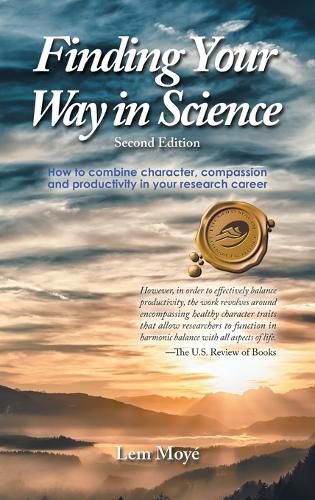Readings Newsletter
Become a Readings Member to make your shopping experience even easier.
Sign in or sign up for free!
You’re not far away from qualifying for FREE standard shipping within Australia
You’ve qualified for FREE standard shipping within Australia
The cart is loading…






This title is printed to order. This book may have been self-published. If so, we cannot guarantee the quality of the content. In the main most books will have gone through the editing process however some may not. We therefore suggest that you be aware of this before ordering this book. If in doubt check either the author or publisher’s details as we are unable to accept any returns unless they are faulty. Please contact us if you have any questions.
Finding Your Way In Science 2nd edition, lays out for the scientist the principles that can produce and sustain the character growth that guides the development of the scientific professional. The central thesis of Finding Your Way in Science is that the relentless pursuit of productivity is not a worthy career goal for the junior scientist. While productivity is and will be a fundamental attribute of the professional, there are other core themes that must be allowed to develop, appear, and exert their influences as well. The presence of self-control and patience, of moral excellence and compassion, of discipline and flexibility are as critical to the development of the junior scientist as is the acquisition of technical skills. The presence of these traits engenders collegiality, persuasive strength, responsibility, administrative diligence, influence, and vision, i.e. the qualities of charitable leadership. Each of the topics in this book is discussed with the goal of not just imparting tactical advice to the investigator, but as part of the general theme that the investigator must develop their professional character in parallel with their productivity record. Like the apples of gold in settings of silver, good character and productivity must go together to develop strong scientists. The audience for this book is broad in scope. It is written at a level for all advanced graduate students, post doctoral researchers, and scientists. It is applicable to all scientific fields, and to researchers in industry, government, and academic institutions.
$9.00 standard shipping within Australia
FREE standard shipping within Australia for orders over $100.00
Express & International shipping calculated at checkout
This title is printed to order. This book may have been self-published. If so, we cannot guarantee the quality of the content. In the main most books will have gone through the editing process however some may not. We therefore suggest that you be aware of this before ordering this book. If in doubt check either the author or publisher’s details as we are unable to accept any returns unless they are faulty. Please contact us if you have any questions.
Finding Your Way In Science 2nd edition, lays out for the scientist the principles that can produce and sustain the character growth that guides the development of the scientific professional. The central thesis of Finding Your Way in Science is that the relentless pursuit of productivity is not a worthy career goal for the junior scientist. While productivity is and will be a fundamental attribute of the professional, there are other core themes that must be allowed to develop, appear, and exert their influences as well. The presence of self-control and patience, of moral excellence and compassion, of discipline and flexibility are as critical to the development of the junior scientist as is the acquisition of technical skills. The presence of these traits engenders collegiality, persuasive strength, responsibility, administrative diligence, influence, and vision, i.e. the qualities of charitable leadership. Each of the topics in this book is discussed with the goal of not just imparting tactical advice to the investigator, but as part of the general theme that the investigator must develop their professional character in parallel with their productivity record. Like the apples of gold in settings of silver, good character and productivity must go together to develop strong scientists. The audience for this book is broad in scope. It is written at a level for all advanced graduate students, post doctoral researchers, and scientists. It is applicable to all scientific fields, and to researchers in industry, government, and academic institutions.